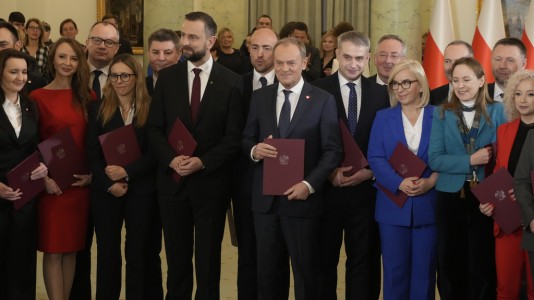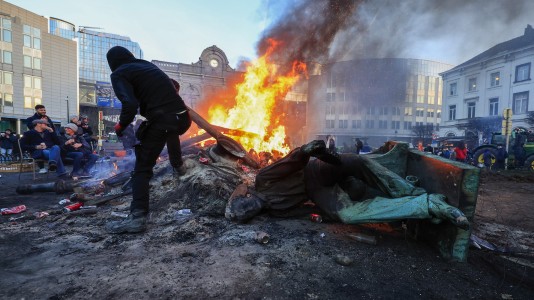Spain’s proposed amnesty law was voted down by Carles Puigdemont’s Junts per Catalunya (Together for Catalonia), or Junts, on January 30. Pedro Sánchez had agreed to this in exchange for Junts’ help to make him prime minister again. The amnesty law was to free thousands of Catalan separatists from all charges linked to the organization of an illegal referendum on independence in 2017. It is now feared Pedro Sánchez will make more concessions to keep his post of prime minister, extending the amnesty to acts of terrorism.
To get the support of Catalan separatists, a condition Sánchez had to agree to was to create special parliamentary investigation committees to review past actions by prosecutors and judges against them, to make sure their proceedings had not been politically motivated.
Unsurprisingly, such violation of the principle of judicial independence has left EU institutions indifferent, in contrast to their past dealings with countries governed by conservative, right-wing governments, namely Poland and Hungary.
The agreement, however, has been for now torpedoed by a new case into possible acts of terrorism opened by judges against Carles Puigdemont, making the latter and his party demand from Sánchez that the amnesty law be extended to acts of terrorism. Sánchez has so far refused, instead accusing judges of playing politics and manipulating the meaning of terrorism.
Among those who could be amnestied if Sánchez finally bows to Junts’ demands, as he is likely to do, are members of the Committees for the Defense of the Republic (CDR), previously named Committees for the Defense of the Referendum, which were groups that formed in preparation for the 2017 independence referendum.
Following an investigation by the Guardia Civil in 2019, several members of the CDR were arrested in Barcelona on charges of terrorism and possession of explosives, and the organization was defined in 2021 as a “criminal organization with terrorist purposes (and) capacity of assault, occupation, and seizure of institutional Catalan buildings and infrastructures.”
It is suspected the CDR was planning attacks as retaliation for the trial of Catalonia independence leaders after the illegal independence referendum held in Catalonia in 2017.
In order to get the necessary votes in parliament to form a new government after last July’s parliamentary elections, Sánchez, the leader of the Spanish socialist party (PSOE), had to form a pact with fugitive Carles Puigdemont, the Junts leader and former president of the region of Catalonia responsible for organizing the illegal referendum of 2017.
Since 2018, Spain’s current prime minister has been heading a coalition of socialists, communists, and other radical leftists, with the support in the Spanish Parliament of regional autonomists and separatists, something that had never happened since the country’s democratic transition in the 1970s, after the death of General Franco.
There are currently 12 CDR members who are standing trial on terrorism charges.
Another case of possible terrorism has been opened by a judge concerning the riots organized at Barcelona’s El Prat Airport by another Catalan independence organization, Tsunami Democratic, in October 2019, during which a French tourist died of a heart attack. In this case, too, the goal was to protest against the charges brought against the region’s political leaders for their responsibility in organizing the 2017 referendum. In that respect, an investigation has been opened against Carles Puigdemont himself on suspicion that he could have contributed to the riots being organized.
This was yet another reason for him to demand that the amnesty law also cover acts of terrorism.
However, as some legal experts are now warning, this could lead to a tragic repeat with Jihadists and other terrorists of what happened with rapists and other sexual offenders as a result of the Sánchez government’s “Only yes means yes” law, which resulted in the early release of hundreds of rape and sexual assault offenders in 2022.
[pp id=83111]
Just as judges who released these convicts based on the new law were called male chauvinists and fascists by Sánchez’s far-left coalition, the ruling coalition is now attacking the judges who have brought terrorism charges against the separatists whose support in parliament it so badly needs, being short of an absolute majority.
On Monday, Spain’s judicial council, the CGPJ, which is the institution in charge of supervising the judiciary, was to gather to react to the attacks and accusations formulated against judges a week earlier, during the debate that preceded the vote on the amnesty law. The attacks against judges were heard during a discussion about one of the components of the future law that had been agreed upon with Catalan separatists, which is the creation of special parliamentary committees to investigate possible past cases of “lawfare” by judges and prosecutors.
By “lawfare,” the authors of the agreement between Sánchez’s coalition government and Junts mean that some judges and prosecutors could have been conducting legal warfare against Catalan separatists in the wake of the 2017 illegal referendum.
The creation of such parliamentary investigation committees has been deemed a gruesome attack on judicial independence and on the principles of equality before the law and the rule of law in Spain by all major judicial associations, as well as by the top bodies of the country’s judiciary. It has not, however, triggered a reaction by EU institutions of the kind Poland and Hungary have experienced for much less when governed by right-wing conservative governments.
[pp id=101429]
During the debate last week, some judges and prosecutors involved in the proceedings against those responsible for organizing and conducting Catalonia’s illegal independence referendum were accused by name by the Junts spokeswoman but also by MPs from the ruling coalition, and in particular from Sumar, Sánchez’s far-left coalition ally.
During the votes on the amendments to the amnesty law proposed by Junts and rejected, for now, by the prime minister and his socialist party (PSOE), Sumar MPs voted with the Catalan separatists and against the government of which they are part, including in favor of extending the planned amnesty to crimes of terrorism.
Meanwhile, in the European Parliament, Spanish socialists have been working on keeping Catalan separatists out of the scope of a planned anti-corruption directive that would prohibit amnesties for political leaders convicted of corruption.
[pp id=87843]
It is all the more likely that the socialist prime minister will eventually bow to Junts’ demands that their seven votes are needed in the Congress of Deputies to pass the 2024 budget. The ruling coalition’s failure to get the 2024 budget through parliament would make early elections likely, and Pedro Sánchez has proved many times in the past that he is ready for any concession that will help keep him in power. He also knows that, just like in the case of Donald Tusk now trampling on the rule of law and judicial independence in Poland, supposedly to “restore” the rule of law after eight years of PiS government, Brussels will be looking the other way.
An indication of Sánchez’s determination to proceed with the amnesty law at all costs is that it was sent back to the Congress of Deputies’ Justice Committee after it was voted down with an absolute majority of votes against it. Normally, in Spanish law, a bill that gathers an absolute majority against it in a plenary vote should be considered as having been ultimately rejected and should not proceed any further.
It is not only the two opposition parties, PP and Vox, that have pointed to this breach of the law by the socialist speaker of the Congress of Deputies, but also the Spanish parliament’s own legal experts.
However, as we now know all too well, in Europe, the rule of law is only something to be respected by right-wing conservative governments, whereas left-liberal governments sharing the ideologies of the elites in Brussels are de facto exonerated.






